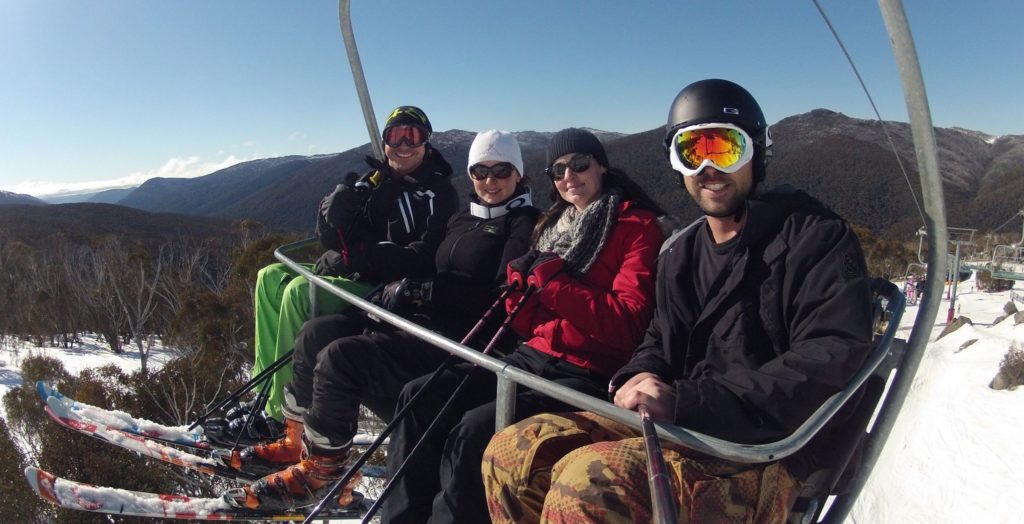A busy ski resort may see dozens of injuries on the slopes each day.
As physiotherapists, we see many patients with ski-related injuries throughout the season. Although accidents do happen, most injuries are the result of poor conditioning or equipment failure.
The most common injuries amongst skiers and snowboarders are knee sprains, shoulder injuries, head/face injuries and wrist/thumb injuries. The knee is the most commonly injured joint, resulting in over a third of all injuries. Injury rates and type vary with uncontrollable factors such as weather and snow conditions. Proper equipment and conditioning, however, are factors that we can control.
Common Ski Injuries
A wide range of injuries occur on the slopes. Knee injuries are very common, particularly injuries of the major knee ligaments. Because skiers and snowboarders frequently put their arms out to break a fall, shoulder injuries — such as dislocations and sprains — often occur. Fractures around the shoulder, wrist and lower leg are also common. Head injuries also occur and can be especially serious.
The most common knee injury from skiing is the MCL (medial collateral ligament) injury. It often results from catching an edge or having the skis diverge, so that the foot is forced away from the body. This creates a distraction force on the inside of the knee. Fortunately, the MCL has a good blood supply, and can be treated non-operatively, with a period of bracing for 4-8 weeks, depending on the severity of the injury.
ACL (anterior cruciate ligament) injuries are also common skiing and snowboarding injuries. They are thought to occur from the forces created by the long lever arm of the ski or board that are transmitted to the knee ligaments. Commonly, the ACL is injured with a hyperextension mechanism or awkward twisting during a fall. In expert skiers, we see ACL injuries when saving a backwards fall by a strong quadriceps contraction, pulling the tibia (lower leg) forward with enough force to rupture the ACL. Recent boot and binding technology has reduced the rate of ACL injuries. The ACL injuries often require surgical reconstruction. Success rates from surgery are excellent, but require aggressive rehabilitation and 9-12 months of recovery time before one can return to skiing or other twisting or pivoting sports.
Proper Preparation
No one wants to go down the path of surgery and recovery. But too many people wait to think about preparing for skiing until half way through the season, when snow has already accumulated and they are on their way to the top of the mountain. Many times, this is too late. Although injury is a risk we all take when participating in any sport, a conscientious approach to skiing – including equipment inspection and conditioning – will minimize the occurrence. Not only will these precautions reduce injury rate, but they will also enhance performance, decrease fatigue, and ultimately, increase one’s enjoyment of the sport.
Several strategies can help prevent ski injuries, such as having the appropriate equipment and choosing ski runs that match your level of experience. Taking ski lessons is especially important for new skiers — learning how to fall correctly and safely can reduce the risk for injury. Even experienced skiers can improve by taking a lesson.
Be sure you are in good physical condition before you set out on a ski outing. If you are out of shape, select ski runs carefully and gradually build your way up to more challenging trails.
Many ski injuries happen at the end of the day, when people overexert themselves to finish that one last run before the day’s end. A majority of these injuries can easily be prevented if you prepare by keeping in good physical condition and stopping when you are tired or in pain.
Conditioning For Your Ski Trip
Skiers can increase their safety and performance by starting with a pre-conditioning program that includes four components: endurance, strength, flexibility and balance. Aerobic fitness is the key to preventing the end of the day injuries (the last run). Cross training, which includes multiple sports and activities in the conditioning regimen, has become popular, especially with a seasonal sport such as skiing. Strength and flexibility focusing on the legs and trunk are vital in injury prevention specific for skiing. Balance training has been shown to be the single most important exercise for preventing ACL tears, particularly in females.
An example of a 6-week conditioning program in preparation for your ski trip:
1. Aerobic fitness (3 days/week for at least 30 minutes)
- Running
- Cycling
- Swimming
- Elliptical or stair climber
- Jumping rope
- Treadmill
2. Strength (2 days/week, 3 sets of 10 of each)
- Step-ups
- Lunges
- Wall squats
- Hamstring curls
- Toe raises
- Lateral leg raises
- Sit-ups
3. Flexibility (daily, 2 sets of 30 seconds each)
- Hamstring stretches
- Calf stretches
- Quad stretches
- Glut stretches
4. Balance Exercises (daily, 2 sets of 30 seconds)
- Standing on one leg, perform mini squats
- Single leg hop, holding landing for 5 seconds, repeat
Ensure Appropriate Equipment
- Wear several layers of light, loose and water- and wind-resistant clothing for warmth and protection.
- Layering allows you to accommodate your body’s constantly changing temperature.
- Check skis and poles are in good condition and properly sized for the individual’s weight, size and skill.
- Buy or rent boots and bindings that have been set, adjusted, maintained and tested by a ski shop that follows industry standards.
- Check the binding of each ski before skiing. The bindings must be properly adjusted to your height and weight.
- Wear appropriate protective gear, including goggles and a helmet. Helmets are sport-specific, so do not wear a bike helmet on the slopes. Ski helmets should be worn.
- Sunglasses, goggles and sunscreen are part of one’s safety equipment
Preparation On The Slopes
Warm up
Research studies have shown that cold muscles are more prone to injury. Skiers need to adequately warm up – an activity that is often neglected with skiing. No one would think of running out on the football field or onto the basketball court without warming up first. But with skiing, one typically sits in the car for an hour or more to get to the slopes, and then stands in line for tickets and for the lift, before finally sitting on the chair for several minutes. By the time one has arrived on the top of the hill, he or she is often stiff and cold. Warm up with jumping jacks, running or walking in place for 3 to 5 minutes. Take a couple of slow ski runs to complete your warm up.
Hydrate
Even mild levels of dehydration can affect physical ability and endurance. Drink plenty of water before, during, and after skiing. Remember “Eat Well, Drink Well, Play Well”.
Know safety rules
Understand and abide by all rules of the ski resort. Know general safety rules of skiing, such as how to safely stop, merge, and yield to other skiers.
Ensure a Safe Environment
- Stay on marked trails and avoid potential avalanche areas such as steep hillsides with little vegetation.
- Watch out for rocks and patches of ice on the ski trails.
- Pay attention to warnings about upcoming storms and severe drops in temperature. Make adjustments for icy conditions, deep snow powder, and wet snow.
Prepare for Injuries
- Skiers should ski with partners and stay within sight of each other. If one partner loses the other, stop and wait.
- Seek shelter and medical attention immediately if you, or anyone with you, is experiencing hypothermia or frostbite.
- Make sure everyone is aware of proper procedures for getting help if injuries occur.
- Listen to your body. Your body will let you know if something is wrong. Pushing through an injury can often lead to a worse outcome.
For more information regarding injury management or prevention contact one of the physiotherapists at Jubilee Sports Physiotherapy.



















